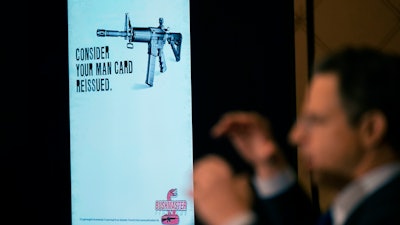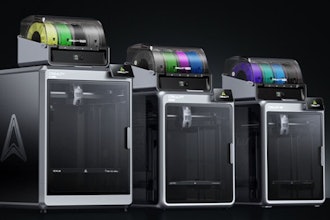
HARTFORD, Conn. (AP) — After agreeing to a $73 million lawsuit settlement with gun-maker Remington, the families of nine Sandy Hook Elementary School shooting victims say they are shifting their focus to ending firearms advertising with macho, military themes that exploit young men's insecurities, all in the hopes of preventing more mass shootings.
The families say Remington used those kinds of ads to promote its AR-15-style rifles like the one used to kill 20 young children and six educators inside the Newtown, Connecticut, school on Dec. 14, 2012.
Remington's marketing strategies are expected to be unveiled when the families' lawyers publicly release thousands of internal company documents obtained during the lawsuit. Lawyers for Remington and its insurers agreed to the disclosure as part of the settlement announced Tuesday.
“This is a case about creating change,” Nicole Hockley, whose 6-year-old son, Dylan, was killed in the shooting, said in an interview after the settlement was announced. “Right now, I'm only waiting really to have access to the documents and to figure out how to use that to help drive safety and better practices for the sales and marketing.”
Hockley, a plaintiff in the lawsuit, has been working with other victims' relatives to stem gun violence through the Sandy Hook Promise organization.
The records could provide one of the most detailed looks yet at the push by firearms manufacturers to popularize AR-15s and similar rifles, gun industry watchers say, especially after a 10-year federal ban on such weapons expired in 2004.
Hockley and outside observers have compared the case to those that led tobacco companies to disclose damaging internal documents and later agree to billions of dollars in settlements over sickened smokers.
It's not clear when the families' lawyers will release the documents. A lawyer for the families, Joshua Koskoff, said the records are being organized for public consumption, a process expected to take weeks.
The documents include emails between employees, internal company presentations and business projections, Koskoff said. He declined to discuss the contents of the records.
“The information that may come out ... there may be features of the way that the gun industry does business that are not either widely known or not widely appreciated,” said Timothy D. Lytton, a law professor at Georgia State University. “This is going to shine a spotlight on the industry’s role in the issue of the problem of gun violence.”
Lawyers for Remington and its insurers did not return messages seeking comment. Remington, founded in 1816 and based in Madison, North Carolina, went bankrupt a second time in 2020, and its assets were later sold at auction to several other companies. Two new companies were created, Remington Firearms and Remington Ammunition.
A message seeking comment was left for Remington Firearms, which announced in November that it will establish headquarters in LaGrange, Georgia. A spokesperson for Remington Ammunition owner Vista Outdoor, based in Anoka, Minnesota, said the settlement involved the former Remington Outdoor Co., not Vista Outdoor or Remington Ammunition.
At the news conference announcing the settlement, Koskoff showed Remington ads that he said appealed to troubled youths like Adam Lanza, the 20-year-old man who carried out the Sandy Hook shooting. Lanza used a Remington-made Bushmaster XM15-E2S rifle that was legally owned by his mother. He killed his mother in their Newtown home before going to the school.
The ads contained messages including “Consider Your Man Card Reissued” and “Clear the Room, Cover the Rooftop, Rescue the Hostage.”
Koskoff said Remington targeted younger, at-risk males in advertising and product placement in violent video games. The lawsuit said the company's advertising played a role in the school shooting, but did not elaborate.
Lanza had severe and deteriorating mental health problems, which combined with his preoccupation with violence and access to his mother's weapons “proved a recipe for mass murder,” a report by Connecticut's child advocate said.
From the 10th grade, Lanza’s mother kept him at home, where he was surrounded by an arsenal of firearms and spent long hours playing violent video games, the report said. His medical and school records included references to diagnoses of autism spectrum disorder, anxiety and obsessive compulsive disorder, although psychiatrists say those conditions are not indicative of future violence.
Robert Spitzer, a political science professor at the State University of New York at Cortland and the author of five books on gun policy, said the case will lead gun manufacturers to consider their marketing carefully. Spitzer, a member of both the National Rifle Association and the Brady gun control advocacy group, said his chief goal is to study all sides of the gun debate.
Spitzer said the Remington case presents a clear warning “to other gun companies that manufacture assault-type weapons to avoid pumping up or emphasizing the military history, the sort of Rambo-like qualities of the weapon. They would be insane to continue to market these weapons by emphasizing those values because they would obviously open themselves up to similar lawsuits.”
The National Shooting Sports Foundation, a gun industry group that happens to be based in Newtown, said the Sandy Hook families never produced evidence that Remington’s advertising had any effect on Lanza. The foundation estimates there have been more than 20 million AR-15-style rifles sold in the U.S. and asserts that few are used in crimes.
According to the latest FBI crimes statistics, of the 13,600 firearms used in homicides in 2020, about 450 were rifles; more than 8,000 handguns were used.
AR-15-style rifles, however, have been used in many notable mass shootings, including Sandy Hook, the 2017 Las Vegas massacre that killed 58 people and wounded hundreds, and the 2018 school shooting in Parkland, Florida, that killed 14 students and three staff members.
Remington's marketing of its AR-15-style rifles before the Sandy Hook shooting contributed to surging sales of the weapon nationwide, Koskoff said. In the mid- to late 2000s, he said, only about 100,000 AR-15s were sold annually in the U.S. But by 2012, the number had skyrocketed to more than 2 million, he said.
He and the Sandy Hook families blamed a private equity firm, Cerberus Capital Management, which bought Remington in 2007, for being more concerned about profits than safety in seeking increased rifle sales. A message seeking comment was left for the firm.
Cerberus, as Remington's owner, was responsible for shifting a lot of the company's focus from traditional hunting rifles to AR-15-style rifles and for the resulting marketing campaigns, Koskoff said.
“They were using tactics of fear and toxic masculinity and appearing more powerful, and their documents talk about their target audience as military wannabes,” Hockley said. “It’s not saying that this (the settlement) is going to stop firearm manufacturers in any way. This is about being responsible in your marketing.”




















